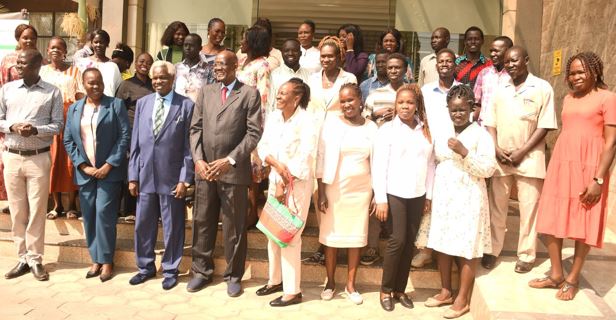A three-day training for judiciary support staff facilitated by the Center for Inclusive Governance, Peace and Justice (CIGPJ), in collaboration with the East African Judiciary, commenced on Monday to empower the workers in case management, especially in the process of handling documents related to gender-based violence and cases involving minors.
Addressing journalists after the opening session at Palm Africa Hotel in Juba, Commissioner Pamela M. Tutui, former state counsel and Commissioner of Assize (High Court Judge) who is currently a consultant researcher and trainer said it is important to train the court support staff because their role starts from the preparations of documents to knowing which case goes to where.
“This training is very important because one, the support staff is the backbone of the judiciary, they are the ones who interact with the little guns or the citizens right from the beginning, they are the ones who prepare the documents, they are the ones who know which case goes where, so if they don’t get it right, then the judges will not get it right,” she said.
According to Tutui, building the capacity of the Judiciary of South Sudan is paramount because what happens in each member state in the region, affects the entire region.
“The training that is going on is very important, not only to the judiciary of South Sudan, but to the community at large, because what we share and what affects each country within the region affects all of us, and it is always good for us to support one another. ‘That is why I am here today so that I can contribute and also share whatever knowledge I have with our brothers and sisters in the Judiciary of South Sudan,” she said. “And also, it depends on how quickly they (support staff) can process the cases, because if they delay the processing, then the case takes long, and when the case takes long, then in law we say that justice delayed is justice denied. It means that the citizens, at the end of the day will say I did not get a hearing or fair justice in the court because my case took so long.”
“At the end of the day, we want everybody to be happy, and when the case moves very fast, it helps the investors and the foreigners to come and invest in the country, because there is confidence in the judiciary, and that confidence translates to a better economy, because then they bring in the money into the country,” Tutui added.
For his part, Justice Dr. Benjamin Bak Deng, Director of Training in the Judiciary of South Sudan, described the support staff as an important category of people and that is why they need to be trained.
“There is a lot that goes into the preparation of a case file to be brought before the judge. Whether this is a clerk or an attendant, this is a very important category of people and employees within the judiciary. That is why the constitution makes it obligatory that the judiciary has to conduct training for functional service,” he stated. “So, it is important that we try our level best to try to train all the members of the support staff to do that work.”




